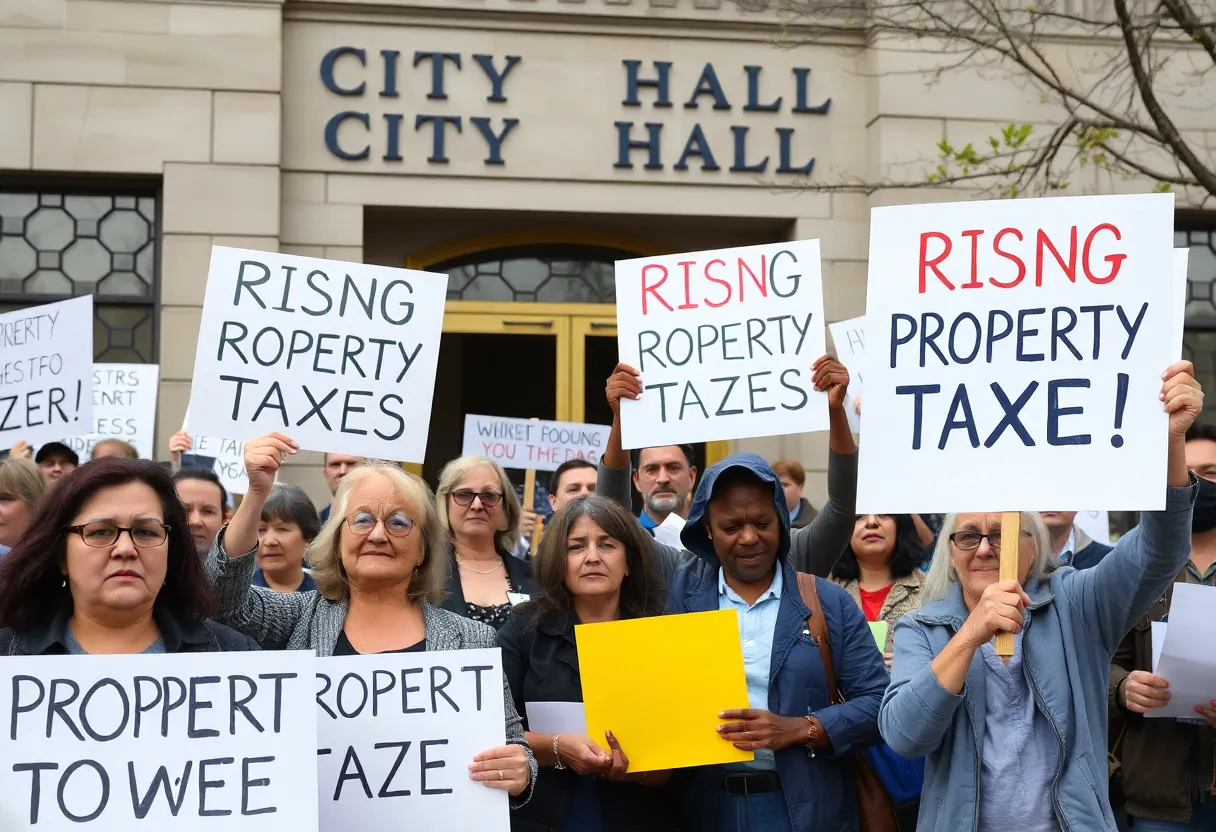Albuquerque, October 26, 2025
Albuquerque residents on fixed incomes rallied at City Hall, expressing frustration over rising property taxes that threaten their financial security. Many attendees shared stories about doubling tax bills, highlighting the impact on seniors and low-income families. Council members proposed a 2% cap on annual property tax increases, but budget shortfalls pose challenges for implementation. Experts warn that without action, the housing market could slow significantly, exacerbating affordability issues. The rally marks a critical moment for policymakers as they balance resident relief and city budgeting needs.
Albuquerque Homeowners Rally at City Hall Over Rising Property Taxes
Albuquerque residents on fixed incomes gathered at City Hall today in a show of frustration over sharply increasing property taxes, calling for immediate relief to ease the financial strain. The rally highlighted growing concerns that unchecked tax hikes are pricing longtime homeowners out of their neighborhoods, especially those living on pensions or Social Security. Demonstrators carried signs and shared stories of tax bills doubling in recent years, emphasizing the need for policy changes to protect vulnerable groups.
The event drew dozens of participants, many of whom detailed how the rises have forced tough choices between essentials like groceries and medications. Organizers focused on the impact on seniors and low-income families, who make up a significant portion of the city’s fixed-income population. This public outcry comes amid a broader surge in property tax assessments across the city, driven by a hot real estate market that has boosted home values and, in turn, tax obligations.
Council’s Proposal for Tax Increase Cap
In response to the mounting pressure, city council members introduced a proposal to cap annual property tax increases at 2%. This measure aims to provide predictability for homeowners, limiting how much taxes can rise each year regardless of property value fluctuations. Supporters argue that such a cap would offer breathing room for those on fixed budgets, preventing sudden jumps that could lead to foreclosures or relocations.
However, implementing this cap faces significant hurdles due to budget shortfalls plaguing city finances. Albuquerque’s government has been grappling with reduced revenues from various sources, including sales taxes affected by economic shifts. Officials note that revenue from property taxes forms a backbone of the city’s funding for services like public safety, schools, and infrastructure. A strict cap could mean less money flowing into these areas, potentially requiring cuts or alternative funding searches.
Potential Impacts on Housing Market
Real estate experts warn that without swift action on property tax relief, the housing market in Albuquerque could experience slowed growth. High taxes deter potential buyers and strain existing owners, possibly leading to fewer transactions and stagnant property values over time. In a market already facing affordability challenges, this could exacerbate issues like inventory shortages and rising rents for those unable to purchase homes.
Experts point to recent trends where tax increases have outpaced wage growth, making homeownership less attainable. If the proposed cap moves forward, it might stabilize the market by encouraging more listings and buyer confidence. Conversely, delays or rejections could fuel further unrest, as seen in today’s rally, and prompt more homeowners to consider selling or appealing their assessments.
Background on Property Tax System
Albuquerque’s property taxes are calculated based on assessed values determined by the county assessor, which reflect market conditions. Over the past few years, a boom in home prices—fueled by low interest rates and population influx—has led to reassessments that significantly hike taxes. For fixed-income residents, these changes represent a direct threat to financial security, as their incomes do not adjust with inflation or market shifts.
The city’s budget relies heavily on these taxes, which account for a substantial portion of operational funds. Recent shortfalls stem from post-pandemic economic recovery unevenness, with some sectors like tourism lagging while others, such as tech and remote work, draw new residents and inflate values. Council discussions on the 2% cap are set to continue, weighing the needs of homeowners against fiscal responsibilities.
Today’s rally underscores a pivotal moment for Albuquerque’s policymakers. As debates intensify, the balance between resident relief and city sustainability remains a key focus. Homeowners hope for quick resolutions, while experts monitor how these developments might shape the local economy in the coming months.
FAQ: Albuquerque Property Tax Rally and Proposals
What prompted the rally at City Hall?
Rising property taxes prompted Albuquerque homeowners to rally at City Hall today, demanding relief for fixed-income residents.
What solution did council members propose?
Council members proposed a 2% cap on increases.
What challenges does the proposal face?
Budget shortfalls complicate implementation.
What do experts predict if the issue isn’t addressed?
Real estate experts predict this could slow housing market growth if not addressed soon.
Key Features of Albuquerque’s Property Tax Concerns
| Feature | Description |
|---|---|
| Rally Trigger | Rising property taxes prompting demands for relief among fixed-income homeowners |
| Proposed Cap | 2% limit on annual tax increases to protect residents |
| Implementation Challenge | Budget shortfalls hindering the cap’s adoption |
| Market Impact | Potential slowdown in housing growth without resolution |
Deeper Dive: News & Info About This Topic
HERE Resources
APS Seeks Community Input on Upcoming Budget
Santa Teresa Solar Project Begins Operations


